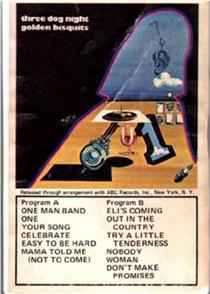
Papa loves mambo, especially if it's recorded on an 8-track tape. Click to enlarge.
“This is gonna replace the CD soon, so I'll have to buy the (Beatles’) White Album again.”
- Agent K (Tommy Lee Jones), as he points out a tiny recorded disc in the research lab to Agent J (Will Smith) in “Men in Black” (1997)
This memorable movie quote speaks to the ever-changing formats of recorded music. Beginning with the cylinders of Thomas Edison, and continuing through 78’s, 45’s, LP’s, tapes, compact discs, MP3’s and iPod’s, music aficionados have had to adapt to changes in the media on which sound is captured.
Manufacturers had sought a format that would allow for the ultimate portability of music. Some automobiles had offered the option of an on-board record player. We can imagine how well that worked when the car hit a pot hole – the listener would hear a sudden skip from the slow to fast section of “MacArthur Park,” for instance. Hit a pot hole deep enough to turn over the record, and you could go from “What I Say” part 1 to part 2 in an instant.
The advent of the 8-track tape brought us a greater degree of reliable portability. According to Wikipedia, the Lear Jet 8-track cartridge was designed in 1964 by Bill Lear, who had also brought us the Lear Jet itself. Ford Motor Company offered 8-tracks as options in their cars beginning in September, 1965. As sales of home units increased, 8-tracks soon appeared alongside LP’s at record stores.
I remember first seeing/hearing an 8-track player at a church youth retreat in the summer of 1970. One of the students had brought his 8-track on the trip. I remember that “Cosmo’s Factory” by Creedence Clearwater Revival was played through several loops. The portability and quality of sound caused me to look into a tape player of my own.
At first, I looked at the 8-track players, which were plentiful on the local market. The Chattanooga Times of December 1, 1971 listed advertisements for 8-tracks at local stores. Zale’s Jewelry offered the Lear Jet Stereo 8 – “On land, sea, or in the air – throw a party for your ears.” K-Mart sold portable AM/FM/8-track units ranging from $88.00 to $193.00, and a console model for $199.00.
I already owned a small reel-to-reel tape player, and enjoyed recording programs off the radio and television or of the family, whenever someone chose to sing like a future American Idol. The 8-tracks were just players. When I saw a portable cassette tape player/recorder/radio by Motorola, I opted for it over the 8-tracks.
I quickly learned that the cassette format was playing David to the 8-track as Goliath. It was difficult to find pre-recorded cassettes. Jack’s Music sold them downtown, as did Loveman’s. Their Yellow Pages advertisement said that their record department would have even delivered a cassette of the Jimmy Castor Bunch, if I had just called for one. My two best sources of cassettes were at Tape Town, owned by Larry Dobbins, at 732-C Ashland Terrace and Tape Village, owned by Phil E. Bacon and Mrs. Evelyn C. Bacon, at 5803 Brainerd Road.
Through high school and college, I continued with the minority cassette format while others in the majority listened to their booming 8-track sounds. Students would gather around someone’s car in the parking lot after school, just to listen to the new 8-track player. When my grandparents moved into a new house, my cousin and her husband bought them a new console record player/radio/8-track player. My father-in-law listened to his 8-track tapes while driving, and kept rhythm by tapping his ring on the steering wheel.
By the early 1980’s, the cassette format won the battle over 8-tracks. Cassettes offered fast-forward and rewind, something that 8-tracks could only simulate through their programs. Eight-tracks sometimes had abrupt sounds of silence during a song while the tape mechanism changed programs. The 8-tracks were also generally less durable than cassettes.
Compact discs later conquered both 8-tracks and cassettes. Now, even CD’s are showing their age. We have the capability to download and store more music than we would have ever dreamed of being able to purchase on cassette or 8-track or CD. Yes, it is just about time to buy the White Album again.
If you have memories of 8-tracks or cassettes, please send me an e-mail at jolleyh@bellsouth.net.

The winning format - the cassette. I guessed wrong on Beta vs. VHS, though. Click to enlarge.